
Although any dental restoration can rebuild your smile’s appearance and functionality, dentures remain popular because they’re often the most cost-effective option. However, that’s not always the case because the rate can vary from person to person based on your unique circumstances. Continue reading to learn more about three factors that can influence the price of your new smile so you can make an informed decision!
Consideration #1: How It’s Made
Like any other restoration, the materials used to create your dentures can greatly impact their cost. For example, the teeth can be made from resin, which is cheaper but tends to wear down faster, or porcelain, which is the standard option because of its resilience but is more expensive. Also, if you require partial prosthetics, they typically include metallic clips, increasing the total due.
Typically, you can expect following ranges based on the quality of the materials used to make your dentures:
- Low-cost: Usually, these are anywhere from $300 to $500 per plate, so $600 to $1,000 for a complete set to replace both arches.
- Mid-priced: You can expect to pay between $1,000 to $3,000 total, or about $500 to $1,500 per arch. However, they’re heat-cured and look more natural than cold-cured, low-cost methods.
- Premium: These are the most expensive options at $2,000 to $4,000 per plate (or $4,000 to $8,000 total), but they are made with top-quality materials and tend to look more authentic.
Consideration #2: Additional Procedures
Before being fitted with dentures, you must consult with your dentist to ensure you’re a good candidate. They’ll examine your mouth to ensure there are no issues that could interfere, like gum disease. They’ll also measure your jawbone density to verify whether it’s strong enough to support your restoration.
If your jaw isn’t strong enough, you might need a bone graft surgery to bulk it up before being fitted with dentures. Other patients need to have their last few remaining teeth extracted for their prosthetics to fit properly. You’ll be responsible for paying the fees associated with any additional treatments required.
Consideration #3: Dental Insurance
Many patients are on a tight budget and want to know whether there’s anything they can do to help lower the cost of their replacement teeth. If you carry dental insurance, you’re in luck! Many policies cover up to 50% of the cost, but every plan is different so it’s worth checking your details. Plus, there may be other restrictions you need to be aware of, like a deductible you must pay before coverage begins or a waiting period that must pass before benefits kick in.
If you are uninsured, don’t lose hope! Many dentists offer flexible financing plans or in-house memberships for discounts on services offered onsite.
Now that you know better what you can expect to pay for dentures, you can plan and move forward accordingly!
About the Author
Dr. Marc Moulton has 30+ years of experience helping people build and maintain happy, healthy smiles. He earned his Doctor of Dental Medicine from the University of Alabama at Birmingham School of Dentistry. Now, he is a member of the American Dental Association, so you know you’re in good hands. He offers a full range of services conveniently under one roof, including dentures. He takes the time to get to know your unique needs and then provides customized treatment plans to help you address them. To replace missing teeth, you can request a consultation on the website or call (205) 988-3360.
